Bahçeşehir University (BAU) is strongly committed to advancing the Sustainable Development Goals (SDGs) through international collaboration, data-driven research, and the co-development of best practices. The university actively contributes to global measurement, evaluation, and knowledge-sharing initiatives aimed at improving policy effectiveness and fostering sustainable impact.
In the section below, examples of international collaborations and research projects conducted by Bahçeşehir University (BAU) during the reporting year are presented. These initiatives illustrate how BAU contributes to reviewing comparative approaches and developing international best practices in addressing the Sustainable Development Goals (SDGs).
1-STExperiMents Project: Developing International Best Practices in STEM Education through Comparative Research and Collaboration: SDG 4 (Quality Education), SDG 9 (Industry, Innovation and Infrastructure)
The image below shows a screenshot from the official website of the STExperiMents Project, displaying Bahcesehir University and other international partner institutions collaborating to develop best practices in STEM education through comparative research.

Bahçeşehir University (BAU) participates in an international research and best practice innovation project designed to advance STEM and STEAM education through comparative analysis and cross-sector collaboration among European universities and teacher training institutions. The project is implemented in partnership with Bahçeşehir – Bahcesehir University (Türkiye), Charles University (Czech Republic), Johannes Kepler University (Austria), and the University of Jyväskylä (Finland).
The project responds to the increasing demand for STEM skills in the European labor market and addresses skill shortages in science, technology, and digital competencies. Its central objective is to develop and test best practice real and virtual STEM experiments that help teachers integrate meaningful, hands-on science and technology learning into their classrooms.
Each partner institution develops two experimental activities—one real and one virtual—along with corresponding assessment methodologies. These activities are piloted, reviewed, and refined collaboratively among partner universities to ensure relevance across different national education systems.
The research outcomes are consolidated into a freely available best practice digital toolkit, featuring detailed guidelines, methodologies, and best practices for enhancing student learning performance and teacher competence in STEM fields.
Through international comparative research, pilot testing, and shared evaluation to create best practice solutions, the project establishes a framework for continuous professional development and innovation in education. Its open-access outputs and dissemination strategy—via academic publications, conferences, and digital networks—contribute to global knowledge exchange.
This initiative directly supports SDG 4 (Quality Education), SDG 9 (Industry, Innovation and Infrastructure), and SDG 17 (Partnerships for the Goals) by promoting cross-border collaboration, educational innovation, and the development of international best practices in STEM education.
2-AI in ADU: Artificial Intelligence in Adult Education and Self-Learning Project: SDG 4 (Quality Education), SDG 9 (Industry, Innovation and Infrastructure)
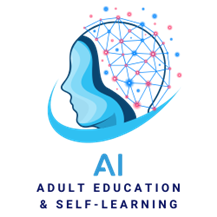
Bahçeşehir – Bahcesehir University (Türkiye) is a partner in the AI in Adult Education and Self-Learning (AI in ADU) project — an international research and best practice development initiative supported by the European Union’s Erasmus+ Program.
The project aims to enhance adult education by developing personalized, flexible, and AI-supported learning experiences. Through comparative research — including literature reviews, focus groups, surveys, and mapping of AI-powered learning platforms — the consortium identifies key opportunities and challenges in integrating artificial intelligence into lifelong learning.
Building on this evidence base, the project designs practical guidelines, video tutorials, and methodological resources for both educators and self-learners, enabling them to adopt AI-based learning tools and to develop internationally transferable best practices in digital education.
The consortium brings together six European organizations: Bahçeşehir University – Bahcesehir (Türkiye), Emphasys Centre (Cyprus), One World One Heart (Poland), PRISM Impresa Sociale (Italy), Bupnet GmbH (Germany), and KulturLife gGmbH (Germany).
The image below shows a screenshot from the official website of the AI in ADU Project, displaying Bahcesehir University and other international partner institutions.
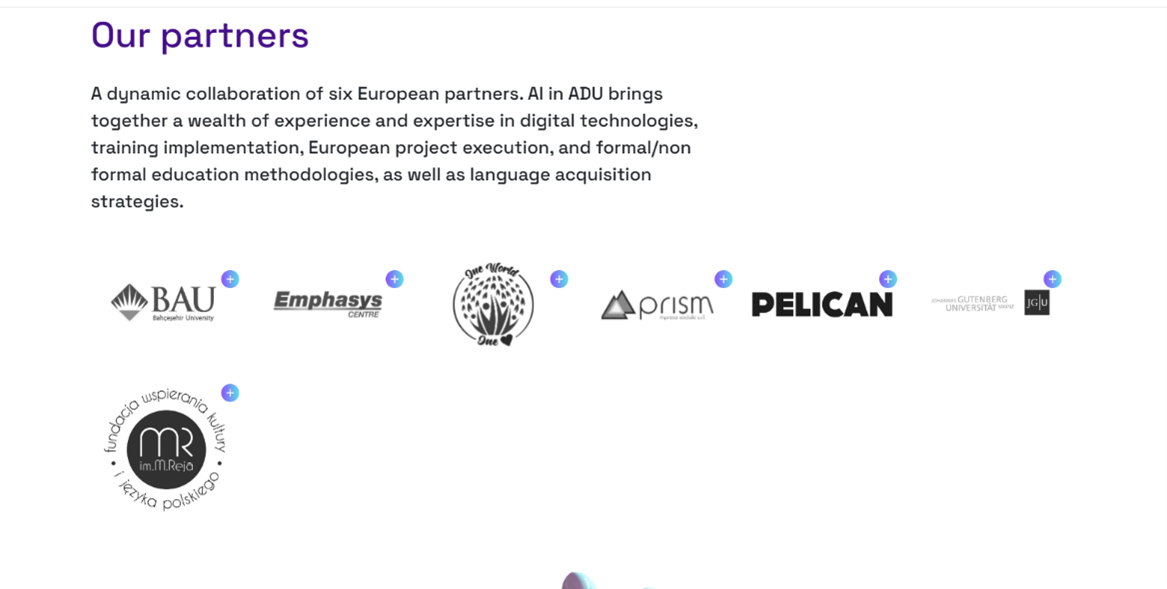
By promoting innovation, inclusion, and open-access learning across Europe, the AI in ADU project directly advances SDG 4 (Quality Education), SDG 9 (Industry, Innovation and Infrastructure), and SDG 17 (Partnerships for the Goals), contributing to a more sustainable and digitally empowered society.
3.MIXAP: Developing Research Based Innovative Pedagogical Practices through Mixed Reality in Education Project

Bahçeşehir University (Türkiye) is a partner in the MIXAP (Mixed Reality in Education) project, an co-funded international research and best practice initiative coordinated by Le Mans Université (France), in collaboration with the Technical University of Denmark (Denmark).
The image below shows a screenshot from the official website of the MIXAP Project, displaying Bahcesehir University and other international partner institutions collaborating to develop research-based innovative pedagogical practices through mixed reality in education.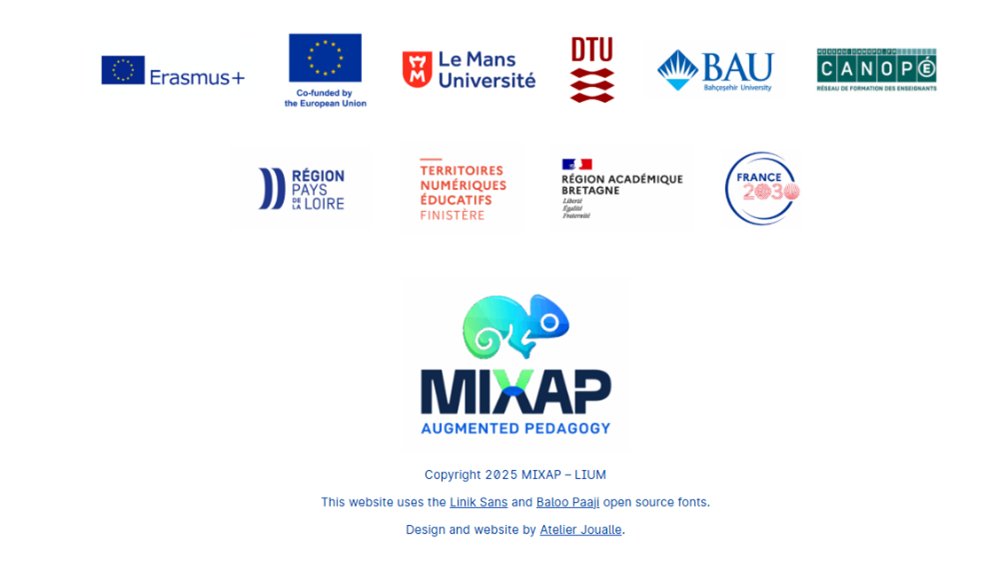
The project aims to empower teachers to design, implement, and evaluate Mixed Reality (MR) learning experiences, fostering a new pedagogical framework that combines technology, creativity, and evidence-based research. Through a co-design methodology, the consortium engages educators in participatory workshops, classroom pilots, focus groups, and cross-country collaboration to develop and refine interactive, inclusive, and impactful best practice teaching systems.
MIXAP also contributes to academic research through peer-reviewed publications and conference presentations in the fields of educational technology, cognitive learning, and augmented pedagogy. Its practical output includes the development of an easy-to-use AR authoring tool, open-access learning resources, and a sustainable international teacher community that shares innovative applications of MR in education.
By advancing both research-based evidence and scalable best practices, the project directly supports SDG 4 (Quality Education), SDG 9 (Industry, Innovation, and Infrastructure), and SDG 17 (Partnerships for the Goals), shaping the future of inclusive and technology-enhanced learning.
4.AI-Based Sustainable Agriculture Research Collaboration Between Türkiye and Malta: SDG 2 (Zero Hunger), SDG 9 (Industry, Innovation and Infrastructure), SDG 12 (Responsible Consumption and Production)
The image below shows the promotional poster of the ‘AI-Based Sustainable Agriculture Research Collaboration Between Türkiye and Malta
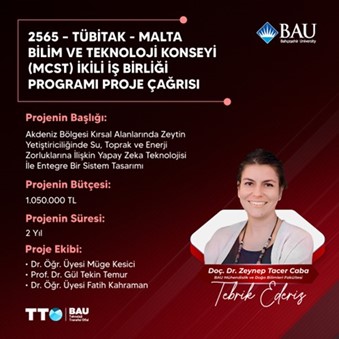
An international research and best practice development project titled “Designing an Integrated System Using Artificial Intelligence Technology to Address Water, Soil, and Energy Challenges in Olive Cultivation in Rural Areas of the Mediterranean Region” has been launched under the joint leadership of Assoc. Prof. Dr. Zeynep Tacer Caba from Bahçeşehir University (Türkiye) and Barbara Bracone, Director of Malta Wes Trade Ltd. (Malta).
Supported through the Bilateral Cooperation Support Program by the Scientific and Technological Research Council of Türkiye (TÜBİTAK) and the Malta Council for Science and Technology (MCST), the initiative aims to develop an AI-driven sustainable agricultural model that integrates climate-smart practices to optimize water, soil, and energy management in olive cultivation. The project specifically focuses on evaluating and implementing the best practices of both countries in addressing these challenges.
The project emphasizes mutual evaluation and transfer of best practices between Türkiye and Malta, drawing on the expertise and local innovations of both countries. Through comparative research, data-driven modeling, and applied field studies, the collaboration seeks to generate scalable solutions for sustainable rural development in the Mediterranean region.
By combining artificial intelligence, environmental science, and cross-border policy dialogue, the project contributes directly to SDG 2 (Zero Hunger), SDG 9 (Industry, Innovation and Infrastructure), SDG 12 (Responsible Consumption and Production), and SDG 17 (Partnerships for the Goals).
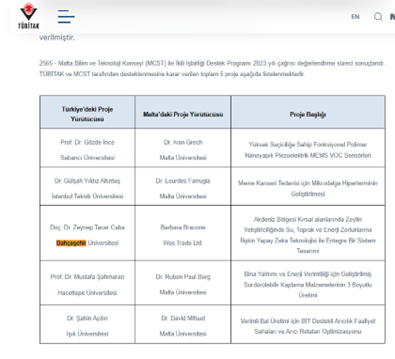
5.FUTURE WOMEN: Creating New Opportunities for Women in Digital and STEM Economies Project

The Future Women Project is an international research and best practice development initiative, supported by the European Union’s Erasmus+ Program, The project is implemented in partnership with Bahçeşehir – Bahcesehir - University (Türkiye), Business Foundation for Education (Bulgaria), Danmar Computers (Poland), Foundation (Greece), Mindshift Talent Advisory (Portugal), Oulu University of Applied Sciences (Finland), VivaFemina (Poland), and the University of Chemical Technology and Metallurgy (Bulgaria).
The image below shows a screenshot from the official website of the FUTURE WOMEN Project, displaying Bahcesehir University and other international partner institutions.
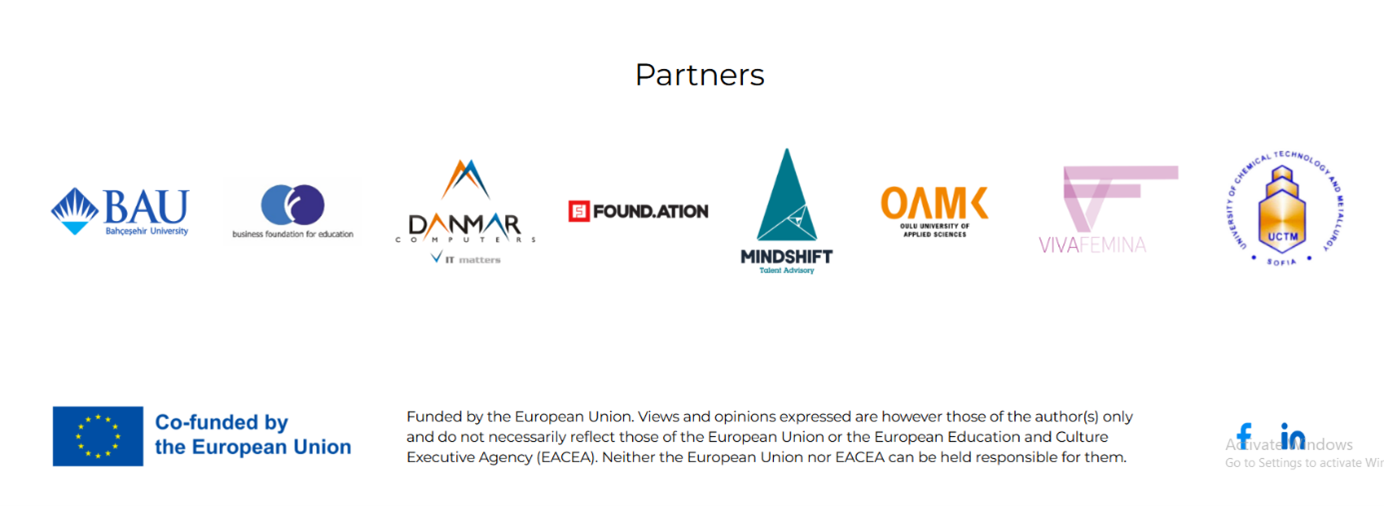
The project aims to strengthen the participation and leadership of women in the digital and STEM sectors, where female representation remains limited. By combining research-based evidence with applied training models, the initiative advances both policy innovation and capacity-building in the field of gender equality and digital transformation.
As part of the project, the Continuing Professional Development (CPD) Program has been designed for career counsellors seeking to adapt to the evolving realities of STEM and digital economy careers.
Grounded in comparative research and field analysis, the program introduces innovative methods and best practice tools to better support female students in pursuing technology-related careers.
The CPD Program includes five key learning modules:
Through its dual focus on research and practical implementation, Future Women contributes directly to SDG 5 (Gender Equality), SDG 8 (Decent Work and Economic Growth), and SDG 17 (Partnerships for the Goals) by promoting inclusive participation, evidence-based policymaking, and gender-responsive innovation in education and employment.
6.Migration, Diversity and Governance (MiDiGo) Project
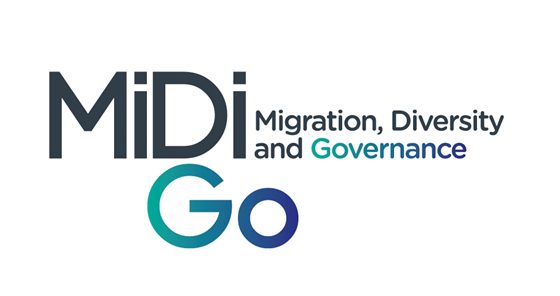
The Migration, Diversity and Governance (MiDiGo) project brings together a consortium of five leading universities from Spain, Italy, Germany, Egypt, and Türkiye, each recognized for their academic and research excellence in the fields of migration, diversity, and governance.
The image below shows a screenshot from the official website of the Migration, Diversity and Governance (MiDiGo) Project, displaying Bahcesehir University and other international partner institutions within the project consortium
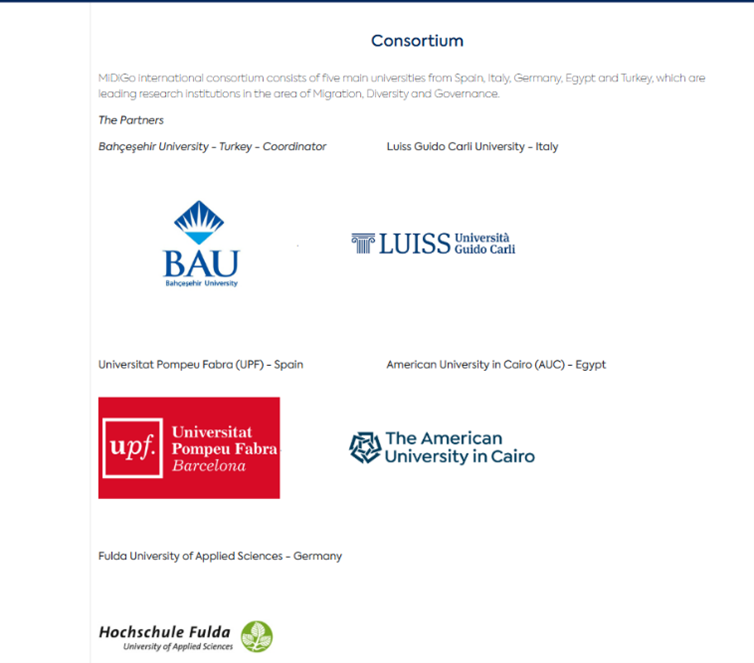
Funded by the European Union, MiDiGo aims to develop and implement best practices for internationalized higher education in migration studies by designing a joint transnational master’s program—the Master’s in Migration, Diversity and Governance (MiDiGo)—with a particular focus on the Mediterranean region.
The project seeks to establish a common academic framework and quality assurance mechanism among partner universities to facilitate mutual recognition of degrees and credits, ensuring academic coherence and international comparability.
Through this collaboration, MiDiGo contributes to shaping a standardized and globally adaptable model for postgraduate education on migration and governance.
Upon completion, the initiative will deliver a modern, integrated, and interdisciplinary curriculum, fostering a new generation of professionals equipped to address migration and refugee issues across academia, government, and civil society. By strengthening academic excellence and transnational cooperation, the project supports the advancement of SDG 4 (Quality Education), SDG 10 (Reduced Inequalities), and SDG 17 (Partnerships for the Goals).